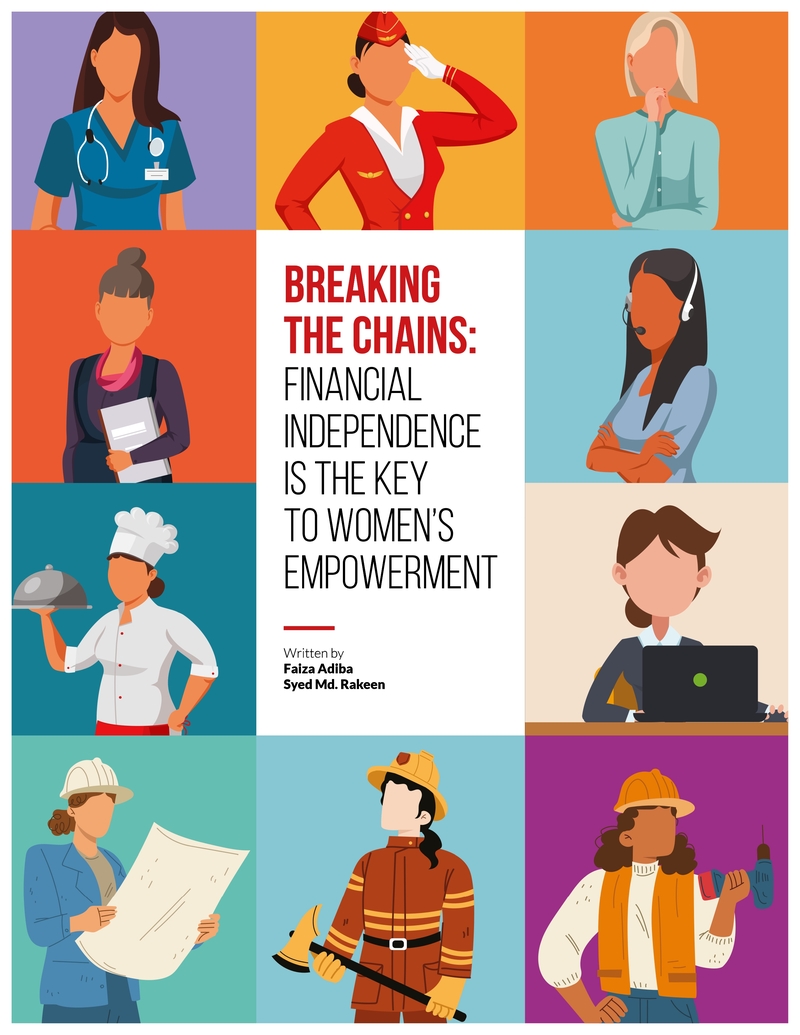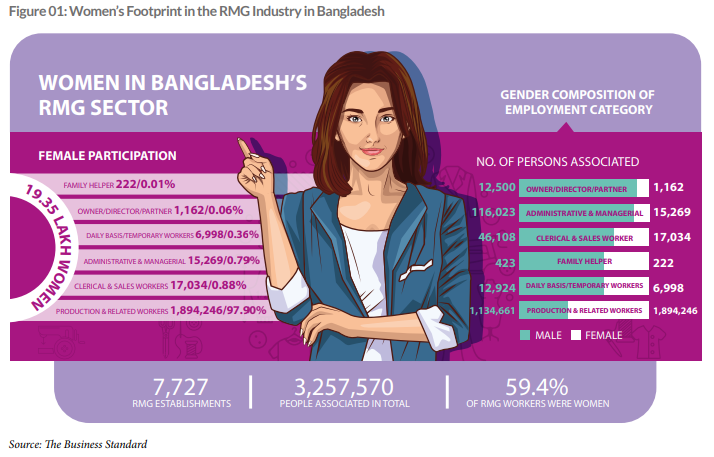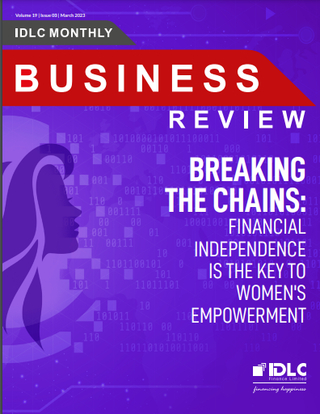
Breaking the Chains: Financial Independence is the Key to Women’s Empowerment
Written by Faiza Adiba and Syed Md. Rakeen
As the world celebrates International Women’s Day, it is important to continue monitoring progress in alleviating strict social and cultural constraints placed upon women. These constraints have long hindered women’s empowerment and financial independence. The fact that organisations and governments are far from eradicating gender inequality despite numerous initiatives over the years speaks volumes about the long-standing deprivation of women’s gender rights. Among the various key areas of empowerment for women, financial independence stands out as a crucial component that opens doors to women’s empowerment. Being financially independent allows individuals to take control of their lives and make choices that align with their goals and aspirations. Financially independent women are empowered to pursue their interests, make informed decisions, and create better futures for themselves and their families.
Increasing the participation of women in the workforce can enhance countries from a socio-economic perspective. According to a McKinsey Global Institute report, the global Gross Domestic Product (GDP) can experience a mammoth rise of USD 12 trillion by 2025 through the narrowing of gender disparities and the strengthening of women’s economic empowerment. Additionally, ensuring gender equality and women’s empowerment fall under the 17 Sustainable Development Goals (SDGs) of the United Nations (UN), further necessitating the importance of bridging the gender gap. On the Gender Inequality Index (GII) of 2021, Bangladesh ranked 131st out of 170 countries, falling behind its South Asian peers barring Pakistan. In order to tackle this imbalance, numerous prominent organisations have made it a priority to promote gender diversity and inclusion in their workforces. They have implemented various measures to support women in the workplace, such as introducing flexible work arrangements, providing mentoring and training programmes, and creating inclusive company cultures. For instance, some companies have established employee resource groups for women, which offer networking opportunities and career development resources. Others have instituted policies that promote work-life balance, such as paid maternal and parental leaves and remote work options, to help women manage their personal and professional responsibilities more effectively. These efforts are aimed at creating more equitable and inclusive workplaces where women can thrive and reach their full potential.
The government is playing a pivotal role in empowering women, especially in education, where the literacy rate of women has increased significantly in the last decade. The National Women Development Policy was established in 2011 to ensure women’s advancement and rights in all sectors of the country. Additionally, the Domestic Violence Prevention and Protection Act was enacted in 2010 to reduce violence against women. However, domestic violence continues to be a prevalent issue, as the law’s efficacy in combating it has not been fully realised. A research study by Action Aid Bangladesh and Jatiyo Nari Nirjaton Protirodh Forum reported that the undisclosed incidents stood at a staggering 72%, while the conviction rates were astonishingly as low as 3.1% as of 2018. Albeit the empowerment of women is gaining traction to a small extent in Bangladesh, with some organisations leading the way, there’s still a long road ahead to achieve gender parity.
Barriers to Financial Independence for Women
According to the Time Use Survey 2021 by the Bangladesh Bureau of Statistics, women spend eight times as much time as men on domestic and caregiving tasks. The report reveals that while men allocate approximately 1.6 hours per day to these activities, women spend an average of 11.7 hours, which amounts to almost half of their day. Unfortunately, caregiving tasks are still not recognised as productive labour, and women’s contributions in this area remain unpaid.
Throughout history, women have faced unequal access to opportunities compared to men. Even when women have worked outside the home, they have often been paid less than their male counterparts and have had fewer opportunities for career advancement. This has left many women with little savings or investments for the future, making them more vulnerable to financial instability.
While the concept of women’s empowerment and financial independence is gaining momentum in urban areas of Bangladesh, progress towards enhancing women’s empowerment is slower in rural areas. Since a majority of women live in underdeveloped 14 of 39 Source: The Business Standard or undeveloped areas, efforts to promote women’s empowerment have lagged behind compared to urban areas. It is essential to prioritise the needs of rural women to ensure they receive the same opportunities and benefits as their urban counterparts.
In rural areas, women are often burdened with household chores, which puts them at a severe disadvantage in terms of financial stability. They are often victims of marginalisation and discrimination in various fields, such as politics, employment, and education, and are prohibited from working or studying outside of their homes. Domestic abuse, sexual harassment, and other forms of violence deteriorate the physical and emotional health of these women as well as prevent them from participating in society. A lack of education and training facilities also affects their ability to contribute to the economy and restricts them from attaining financial independence. Additionally, access to financial services is relatively lower in rural areas, which becomes a stumbling block for many rural women looking to be financially independent. Although the aforementioned problems are more prevalent in rural areas, women from urban areas also continue to face similar issues.
Harnessing the Economic Potential of Women in Bangladesh
The success of the Readymade Garments (RMG) sector and its crucial contribution to Bangladesh’s GDP have become commonplace in every news outlet. As per the Bangladesh Bureau of Statistics, nearly 60% of the workers in the RMG sector are women. This acts as a shred of evidence of the importance of women in the advancement of this sector. However, the number of females at the management level is minimal, and this often leads to gender disparity and a poor work environment for women. Women are also actively involved in the agriculture sector, which holds the key to our country’s food security. Additionally, women are now immersing themselves in sectors such as science, technology, engineering, and mathematics (STEM) and are engaging in research in the aforementioned fields.

Women in Bangladesh have been making strides in climbing the corporate ladder and landing leadership roles in recent years. They have been consistently breaking barriers and challenging societal norms. Women, nowadays, hold key positions in both the private and public sectors, including government, banking, and non-governmental organisations (NGOs). The number of women entrepreneurs has also surged in recent years, with many women now empowering themselves to be in leadership roles. According to Meta, since the initiation of the pandemic, more than 70% of female-led businesses have been created on Facebook, coupled with a further 65% on Instagram. As a result of the pandemic, numerous women-owned businesses have flourished via online platforms, and the newly implemented digital loans by financial institutions have provided promise to this sector as well. Digital platforms have opened doors for women entrepreneurs to attain financial independence all over the country. While the female entrepreneurship rate has undoubtedly been experiencing an upturn, only 7% of the nation’s 7 million entrepreneurs are women, as per the World Bank. The significance of women in the economy of Bangladesh cannot be understated at all, further emphasising that the country should accelerate the process of empowering more women to be entrepreneurs.
Promoting Financial Independence and Women’s Empowerment
Firstly, the concerned bodies should keep a close eye on important issues like underage marriages and domestic violence in an effort to eliminate gender disparity. Secondly, legislative reform, gender-responsive social protection, the involvement of female officials in public services, quotas for women’s representation, and support for women’s movements should be implemented. According to an International Monetary Fund (IMF) study, having more women in leadership positions in the corporate sector, fintech companies, and financial policymaking is linked to improved performance and profitability. Hence, more women are required to be involved in financial institutions and formulate financial policies.
As per the United Nations Development Programme (UNDP), politically empowering women can act as a key part of women’s empowerment. Women are underrepresented in Bangladesh’s political system, with very few ministerial positions currently held by women. Engaging the participation of young women in politics can help foster women’s empowerment. A rise in women’s political participation will bring about beneficial changes in politics as well as the country.
UN Women and the International Labour Organisation (ILO) are dedicated to collaborating with the government of Bangladesh to promote initiatives that address discriminatory social norms and the unequal burden of care work while building support for the adoption of macroeconomic policies to achieve genderequitable growth. The World Economic Forum stated that Bangladesh has reduced gender disparity by a staggering 71.4%, ranking ahead of all the South Asian countries as per the Global Gender Gap Index 2022. Although the country underperformed in comparison to 2021, it is a strong indication that Bangladesh is pushing towards gender parity.
Achieving Gender Parity through Shared Responsibilities
According to The Daily Star, women devote over 25% of their daily time to unpaid care labour, while men devote just 3.3% of their time to the same activity. This indicates that women do seven times as much caring work as men do. Women’s unpaid caregiving hours gradually rise with age, reaching a maximum of 6.2 hours for those between the ages of 25 and 59, after which they decline to 2.7 hours. To reduce this gender disparity in labour, men should contribute to women’s financial independence by sharing family chores and providing career support for their spouses. Also, they can participate in initiatives that promote gender equality and women’s economic development. Since they hold the majority of power, from family size choices to decisions concerning policies and programmes at the government level, they can support women by addressing the importance of gender parity, supporting gender equality, and eliminating harmful cultural practices and conventions. It is crucial to promote an inclusive culture that encourages women’s achievement and contributes to the creation of a more fair and just world for everyone. By recognising the value of women’s contributions to the economy and society and providing equal opportunities, Bangladesh can pave the way towards a more equitable and prosperous future for all.
Initiatives Undertaken by Organisations
Organisations and governments have prioritised the inclusion of women in workplaces and the economy. Several NGOs have launched projects in an effort to empower women. Microfinance is one of the key projects that continues to assist rural women with access to credit and financial services. These organisations provide women with funds who do not have access to standard banking services, microloans, or other financial services. Women have benefited from microfinance organisations by starting small enterprises, saving money, and becoming financially independent. Similarly, local and multinational companies now recruit many female employees, and they are playing a crucial role in women’s empowerment. NGOs such as BRAC and ASA have come forward and enabled the spread of financial services to rural women. They are committed to helping the survivors of gender-based abuse and promoting knowledge of women’s financial rights. Relatively smaller NGOs such as Care Bangladesh, Ain o Salish Kendra (ASK), and AMAL Foundation have also led the way in promoting women’s empowerment.
Banks and non-banking financial institutions have introduced new loan products in the last few years, specifically for women entrepreneurs, with the support of Bangladesh Bank. Their new initiatives will revolve around closing the gender gap and increasing women’s access to financial services. Several banks have provided numerous loans, specialised credit facilities, and lending options for female small business owners and entrepreneurs. The Grameen Bank has aided millions of women in obtaining financing and launching their own businesses. To assist women in becoming more financially literate and handling their money wisely, adequate backing is provided along with sufficient financial education and training.
IDLC Finance Limited is playing its role in empowering women to achieve financial independence through a specific form of loan for women entrepreneurs named Purnota. This loan package is a comprehensive lending program catered towards women entrepreneurs in the cottage, micro, small, and medium enterprises sector. With various repayment choices and competitive interest rates, women entrepreneurs can maximise business expansion by employing this low-cost fund while receiving the loans as quickly as possible. In addition to these advantages, IDLC Purnota provides capacitybuilding training, networking events, and market linkage initiatives to assist women entrepreneurs in expanding their enterprises. Until 2022, IDLC Finance Limited has provided loans to more than 17 of 39 5,000 women and will continue to support them in their entrepreneurial journey.
Bangladesh can ultimately reach its aim of being a developed nation and offer its population a brighter future if it continues to empower women economically and socially. Financial independence is essential for the long-term financial stability of women, and this will allow them to be better equipped with a plan for the future, save for retirement, invest in their own education, and grow professionally throughout their careers. This, in turn, will translate to a lower likelihood of experiencing poverty and financial trouble in old age. The scarcity of reliable and up-to-date statistics about women in Bangladesh creates difficulties in assessing the extent of help required by women. Reliable and dedicated researchers are required to obtain the latest data in a bid to reach out to women in need and empower them to play a role in the advancement of the country’s economy. The responsibility of decreasing gender inequality and promoting women’s inclusion should not only rest on the shoulders of the government, NGOs, or even financial institutions. Rather, the general public should also brace themselves to support women-led businesses and help grow their ventures. International Women’s Day serves as a reminder that while women have made significant progress in Bangladesh, the country has a long way to go before reaching gender equality and gender parity.
The authors, Faiza Adiba and Syed Md. Rakeen, are working as Head of Purnota and Industry and Equity Analyst in the SME Division of IDLC Finance Limited, and they can be reached at faiza@ idlc.com and rakeen@idlc.com, respectively.

Breaking the Chains: Financial Independence is the Key to Women’s Empowerment
Financial independence is a crucial aspect of women’s empowerment because it enables women to take charge of their lives and make well-informed choices to build a better future for themselves as well as for their families, society, and the country at large. Research from the McKinsey Global Institute shows that the global GDP could grow by USD 12 trillion by 2025 if gender gaps are closed and women are given more economic power.
Women have been deprived of equal access to opportunities as their male counterparts throughout history. Despite comprising 60% of the workforce in the RMG industry of Bangladesh, the dearth of women at the industry’s management level is leading to gender inequality and poor work culture. The gender pay gap has left women with little savings and investments for the future, making them more exposed to economic instability.
Notwithstanding numerous hurdles, women in Bangladesh have made significant progress in recent years in climbing the corporate ladder and gaining leading positions. They have continually broken through boundaries and challenged societal norms. Bangladesh can pave the road to a more equitable and prosperous future for everybody by recognising the value of women’s contributions to the economy and society and giving them equal chances.
Md. Shah Jalal
Editor
IDLC Monthly Business Review